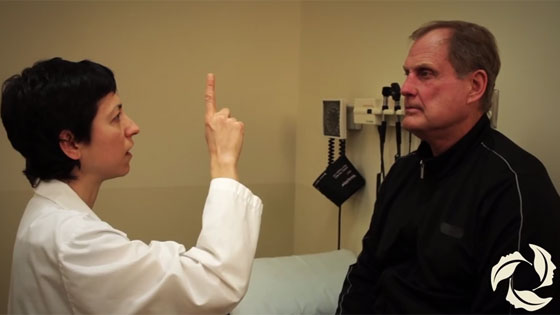
Research following retired football players who had suffered multiple concussions and expressed concern over changes in their behaviour, found a brain abnormality may be the cause of these changes. (Photo: UHN)
Individuals who have sustained multiple concussions in the context of contact sports often show changes in their cognitive and neuropsychiatric functioning in clinical settings. But there has been little scientific evidence mapping the development of these changes to distinct brain areas.
For the first time, researchers with the Canadian Sports Concussion Project (CSCP) at the Krembil Neuroscience Centre have shown that there may be a specific brain abnormality that links multiple concussions with specific behavioural changes.
Through a combination of neuropsychological testing, brain imaging and machine learning, results showed that retired football players who displayed increases in impulsive behaviour, aggression and mania also had abnormalities observed in their brains.
Related to this story:
The study's findings, published in the journal
Brain Structure and Function, show a link between sustaining multiple concussions, and a change in structure to the brain network responsible for regulating behaviour – known as the frontotemporal cortical network.
"These results though based on a small sample, are very interesting," says Dr. Karen Davis, Senior Scientist and Head, Division of Brain, Imaging, and Behaviour – Systems Neuroscience of Toronto Western Research Institute. "Not only do they demonstrate what part of the brain certain concussion symptoms may be associated with, but also that machine learning may be useful as a potential prognostic tool for brain injury after concussions."
Machine learning is the use of computer software that can provide prediction and guidance for treatment. Data collected through the study of an illness is put into a specially developed algorithm to see if the software can find patterns or differences by comparing, in this case, the concussed athletes with healthy controls. Although relatively new as an application in medical research, machine learning allows experts to analyze more data than they could otherwise and better classify the patterns they observe.
"As we figure out how to refine the algorithm and make better use of this tool, in the future it might be able to tell us what's wrong with the brain," adds Davis. "That information can help better direct a patient's treatment or perhaps even tell us how to recognize what brain structures are more vulnerable to concussions."
As much as the future of this research is interesting, investigators were also encouraged to find correlations between abnormalities in the white matter of the brain and the participating athletes' behaviour.
"Through standard neuropsychological tests, we found that the group of retired football players ranked higher on scales for mania and aggression, and performed poorly on a task to measure their inhibitory control," says Dr. Robin Green, Canada Research Chair (ii) in traumatic brain injury, Toronto Rehabilitation Institute, who evaluated the players and was a co-author of the study. "Although we need to study a larger group to see if the pattern repeats itself, we are slowly but surely teasing out how damage to one part of the brain expresses itself in a person's behaviour."
The CSCP, founded by Dr. Charles Tator, is one of few research projects in the world to examine the entire spectrum of concussion disorders from acute injury to chronic illness to possible brain degeneration. The team harnesses the expertise of world leaders in brain injuries, imaging, genetics, clinical care and psychiatry to further our understanding of this common brain injury.
This most recent study to be published by members of the CSCP team, is part of ongoing clinical research involving former professional football and hockey players, and other professional athletes to help better understand the changes in the brain that may occur due to multiple concussions.
